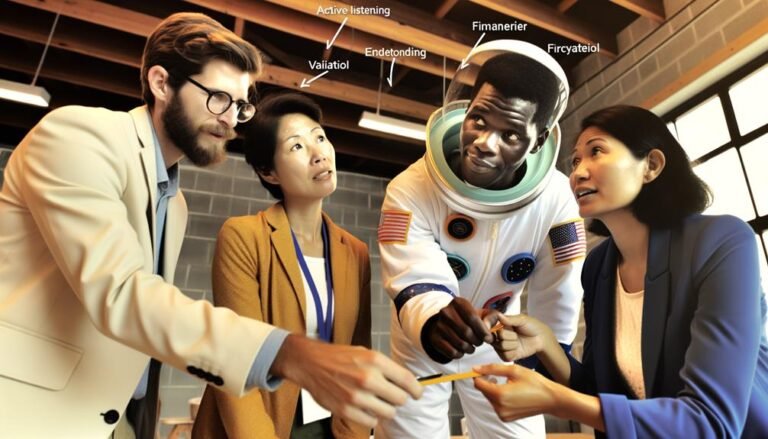What Is Mentoring?
Within the realm of professional development, mentoring serves as a guiding beacon for individuals navigating the complexities of their careers. The essence of mentoring goes beyond mere advice-giving to encompass a profound relationship rooted in trust, knowledge sharing, and mutual growth.
As we explore the nuances of what mentoring truly entails, we uncover a world where seasoned wisdom meets burgeoning potential, where experiences converge to shape destinies.
Stay tuned as we unravel the layers of this dynamic alliance and uncover the transformative impact it holds for both mentors and mentees alike.
Key Takeaways
- Mentoring is a professional relationship that enhances job satisfaction, career progression, and productivity.
- Different types of mentoring include traditional, reverse, group, distance, and peer mentoring.
- A successful mentor-mentee relationship requires trust, open communication, goal setting, and mutual respect.
- Best practices for mentoring involve clear objectives, mentor-mentee training, thoughtful matching, and regular evaluations.
Definition of Mentoring
Mentoring is a professional relationship characterized by the provision of guidance and support from a more experienced individual to a less experienced individual in a specific field or area of expertise. This relationship is built on the mentor's ability to offer professional guidance, drawing from their own experiences and expertise to support the growth and development of the mentee.
The mentor provides mentor support by sharing knowledge, insights, and advice, helping the mentee navigate challenges, make informed decisions, and achieve their goals. Through this collaborative partnership, the mentor encourages the mentee to enhance their skills, build confidence, and excel in their chosen field.
Importance of Mentoring
In the realm of professional development and career advancement, understanding the significance of mentorship is paramount for both individuals and organizations.
- Mentoring plays a crucial role in enhancing development by providing mentees with valuable skills, boosting their confidence, and aiding in effective decision-making.
- It fosters growth by offering mentors a sense of satisfaction, exposing them to diverse perspectives, and strengthening their own skills.
- Moreover, mentoring contributes to the overall development of individuals, supporting their learning journey and career progression, while also aligning with organizational goals and promoting a culture of continuous learning and work-life balance.
Mentoring Techniques
Effective mentorship relies on a variety of techniques tailored to the specific needs and dynamics of the mentor-mentee relationship. Different mentoring models cater to diverse preferences and objectives.
One-on-One Mentoring pairs experienced mentors with mentees for personalized guidance.
Group Mentoring involves one or several mentors working with multiple mentees, fostering collaboration and learning from group dynamics.
Peer Mentoring offers mutual support among individuals with similar experiences, promoting peer learning and growth.
Virtual mentorship, or Distance Mentoring, leverages technology to connect mentors and mentees remotely, enabling flexibility and accessibility.
Additionally, Reverse Mentoring allows junior employees to mentor senior professionals, enhancing leadership development and encouraging knowledge exchange across levels. These techniques play a crucial role in providing peer support, fostering leadership development, and facilitating effective mentorship relationships.
Finding a Mentor
Building a strong mentoring relationship begins with strategically identifying and connecting with a mentor who aligns with your goals and aspirations. When seeking a mentor, consider the following:
- Mentorship benefits: Understand how mentorship can enhance your effectiveness, skill acquisition, confidence, decision-making, and career development.
- Mentor matching: Look for mentors who possess the expertise, experience, and qualities that complement your aspirations and areas for growth.
- Utilize available resources: Enroll in formal mentoring programs, leverage internal networks through HR departments, connect with admired professionals, seek recommendations from trusted connections, and explore mentoring opportunities within professional organizations like ATD chapters.
Building Mentoring Skills
Enhancing mentoring skills is pivotal for both mentees and mentors to facilitate meaningful professional growth and development. Skill development is essential for mentors to effectively guide and support mentees in their career journeys. By honing mentoring skills, mentors can provide valuable insights, constructive feedback, and relevant resources to help mentees excel.
Additionally, mentors who focus on skill development can enhance their own leadership abilities, communication skills, and emotional intelligence. This continuous learning process not only benefits the mentees' career growth but also contributes to the mentors' personal and professional development.
Ultimately, building mentoring skills is a mutually beneficial process that fosters a supportive and nurturing environment for career advancement and success.
Role of Mentors
Transitioning from focusing on skill development, understanding the role of mentors is crucial in shaping successful mentoring relationships and fostering professional growth. When considering the role of mentors, it is important to recognize the following:
- Mentor qualities and Mentorship benefits: Effective mentors possess empathy, active listening skills, experience, and a willingness to share knowledge. Mentorship benefits include personal satisfaction, leadership development, and the opportunity to give back to the profession.
- Mentorship impact and Mentorship strategies: Mentors have a significant impact on mentees' career advancement, confidence, and skill development. Mentorship strategies involve setting clear goals, providing constructive feedback, and creating a supportive environment for learning and growth.
Understanding these aspects can enhance the effectiveness of mentoring relationships and contribute to the overall success of both mentors and mentees.
Benefits of Mentoring
Mentoring provides invaluable support and guidance for individuals seeking to advance their professional development and career growth. By enhancing performance and fostering skill development, mentoring plays a crucial role in accelerating career progression.
Mentees benefit from the wealth of knowledge and experience that mentors provide, leading to increased confidence, improved decision-making abilities, and expanded networks. Additionally, mentoring relationships contribute to job satisfaction and work-life balance, ultimately aiding in overall career satisfaction.
Through mentorship, individuals can gain insights into different career paths, receive constructive feedback, and set achievable goals, all of which are essential for long-term career growth and success.
Mentor-Mentee Relationship
The foundation of a successful mentoring relationship lies in the establishment of trust, open communication, and a shared commitment to growth and development. When embarking on a mentor-mentee journey, it is crucial to prioritize the following key elements:
- Establishing Trust: Building a relationship based on trust is fundamental for effective mentoring. Trust allows for open dialogue, vulnerability, and mutual respect.
- Setting Goals: Clearly defining objectives and milestones helps steer the mentoring relationship towards tangible outcomes. Setting goals provides direction, motivation, and a sense of accomplishment for both mentor and mentee.
- Open Communication: Encouraging transparent and honest communication fosters a supportive environment where feedback can be freely exchanged. Effective communication ensures alignment, understanding, and progress towards shared goals.
Types of Mentoring
Different forms of mentoring exist to cater to diverse learning styles and professional needs within various organizational settings.
Virtual mentoring leverages technology to connect mentors and mentees regardless of physical location, enhancing accessibility and flexibility.
Peer support involves individuals with shared experiences providing guidance and encouragement to one another, fostering a sense of community and collaboration.
Group dynamics in mentoring allow for multiple mentors to work with a group of mentees, promoting teamwork and diverse perspectives.
Reverse mentoring flips the traditional mentor-mentee relationship by having junior employees mentor senior professionals, facilitating knowledge exchange and generational learning.
Each type of mentoring brings unique benefits and opportunities for growth in both personal and professional development.
Best Practices in Mentoring
Drawing on the diverse forms of mentoring discussed previously, optimal mentoring outcomes are achieved through adherence to established best practices. To ensure effective mentoring relationships, consider the following strategies:
- Clear Communication: Foster open and transparent communication channels between the mentor and mentee to facilitate understanding and trust.
- Goal Alignment: Establish mutually agreed-upon objectives and milestones to guide the mentoring journey and track progress effectively.
- Regular Feedback: Encourage continuous feedback loops to provide constructive criticism, acknowledge achievements, and address any challenges promptly.
Conclusion
In the intricate tapestry of professional development, mentoring emerges as the guiding light that illuminates the path to success. With its diverse techniques, pivotal role, and transformative power, mentoring is not just a mere relationship but a catalyst for growth and excellence.
By embracing the essence of mentoring, individuals and organizations can unlock their full potential and soar to new heights of achievement. In essence, mentoring is the key that unlocks the door to unparalleled success.







